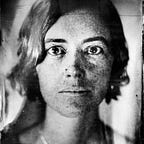This Beautiful Place
People have always fought to be free
 The light has been returning for two months, but inside their cells the women can’t tell that the sun has just set. There are no windows. The yellow-orange of fluorescents light the halls. Kristin and I meet with the women twice a month, buzz into the detention center from the sidewalk, and wait for the guard to come. We pass through the metal detectors, turn in our driver’s licenses, and pause at three different bolted doors as the guard buzzes each of them open.
The light has been returning for two months, but inside their cells the women can’t tell that the sun has just set. There are no windows. The yellow-orange of fluorescents light the halls. Kristin and I meet with the women twice a month, buzz into the detention center from the sidewalk, and wait for the guard to come. We pass through the metal detectors, turn in our driver’s licenses, and pause at three different bolted doors as the guard buzzes each of them open.
The light from the lengthening days makes it feel like anything is possible — for me, for the women in the jail, for the world. It is March and still bitter cold, but even that feels impermanent. Poetry is our balm; poetry is the way we can find our bearings. Today, Maggie Smith’s “Good Bones” is at the center of our lesson plan — a poem I’d read over and over before I began volunteering in the jail. Her words made me feel less alone as I considered the ways the world was terrible, because I felt we were considering it together, as mothers. The poem offered me a way to understand how to raise children in a world of extreme weather, rampant disease, gun violence, and so many other human-caused disasters. “The world is at least fifty percent terrible,” Smith writes. “And that’s a conservative / estimate though I keep this from my children.”
